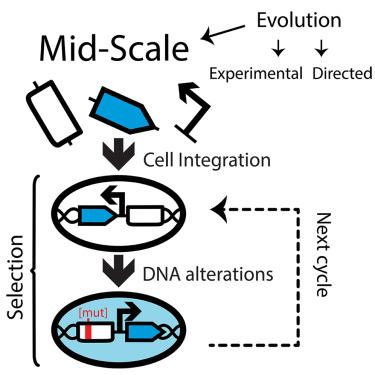Cell Chemical Biology ( IF 6.6 ) Pub Date : 2024-06-25 , DOI: 10.1016/j.chembiol.2024.05.018 Christopher Helenek 1 , Rafał Krzysztoń 2 , Julia Petreczky 3 , Yiming Wan 2 , Mariana Cabral 1 , Damiano Coraci 2 , Gábor Balázsi 4

|
Directed evolution focuses on optimizing single genetic components for predefined engineering goals by artificial mutagenesis and selection. In contrast, experimental evolution studies the adaptation of entire genomes in serially propagated cell populations, to provide an experimental basis for evolutionary theory. There is a relatively unexplored gap at the middle ground between these two techniques, to evolve in vivo entire synthetic gene circuits with nontrivial dynamic function instead of single parts or whole genomes. We discuss the requirements for such mid-scale evolution, with hypothetical examples for evolving synthetic gene circuits by appropriate selection and targeted shuffling of a seed set of genetic components in vivo. Implementing similar methods should aid the rapid generation, functionalization, and optimization of synthetic gene circuits in various organisms and environments, accelerating both the development of biomedical and technological applications and the understanding of principles guiding regulatory network evolution.
中文翻译:

合成基因电路进化:中等规模的见解和机遇
定向进化专注于通过人工诱变和选择来优化单个遗传成分以实现预定的工程目标。相比之下,实验进化研究整个基因组在连续繁殖的细胞群体中的适应,为进化理论提供实验基础。这两种技术之间存在一个相对尚未探索的中间地带,即在体内进化出具有重要动态功能的整个合成基因回路,而不是单个部分或整个基因组。我们讨论了这种中等规模进化的要求,并假设了通过适当选择和体内遗传成分种子组的有针对性的改组来进化合成基因电路的例子。实施类似的方法应该有助于在各种生物体和环境中快速生成、功能化和优化合成基因电路,加速生物医学和技术应用的发展以及指导调控网络进化原则的理解。































 京公网安备 11010802027423号
京公网安备 11010802027423号